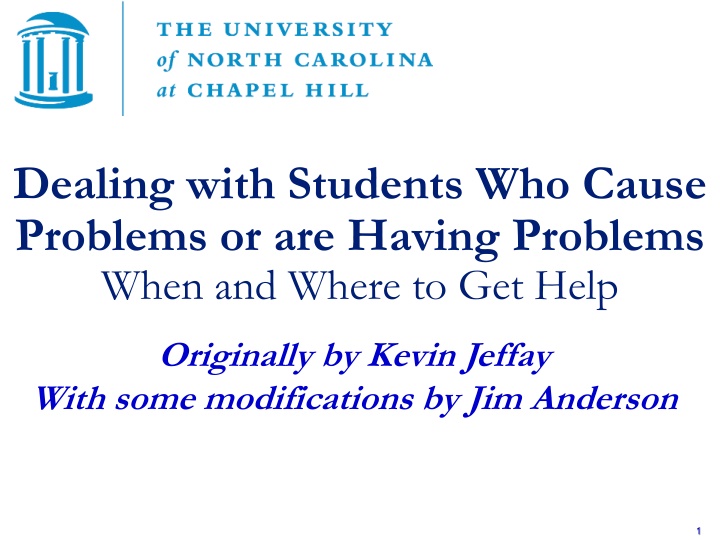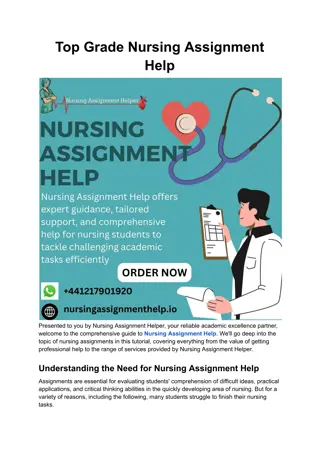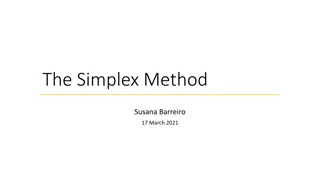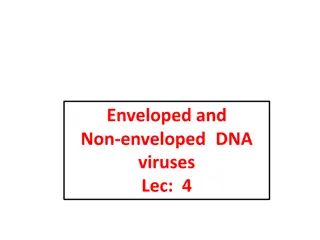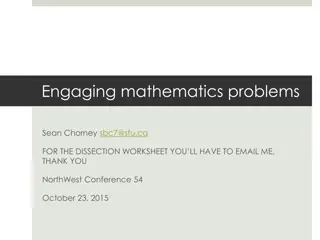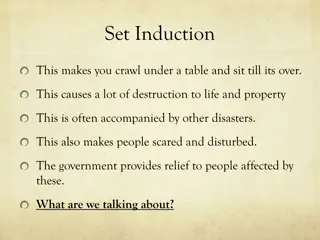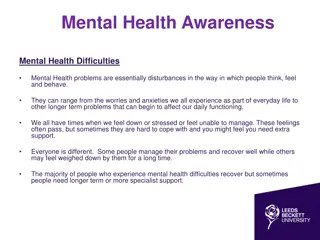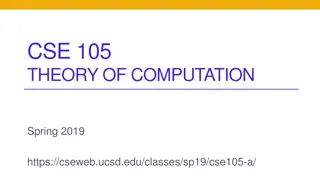Dealing with Students Causing Problems or in Need of Help
Recognize and address student behaviors and mental health challenges in an educational setting. Get statistics on student mental health issues, manage undesired behaviors, prevent disruptions in class, and provide support to students in need.
Download Presentation

Please find below an Image/Link to download the presentation.
The content on the website is provided AS IS for your information and personal use only. It may not be sold, licensed, or shared on other websites without obtaining consent from the author.If you encounter any issues during the download, it is possible that the publisher has removed the file from their server.
You are allowed to download the files provided on this website for personal or commercial use, subject to the condition that they are used lawfully. All files are the property of their respective owners.
The content on the website is provided AS IS for your information and personal use only. It may not be sold, licensed, or shared on other websites without obtaining consent from the author.
E N D
Presentation Transcript
Dealing with Students Who Cause Problems or are Having Problems When and Where to Get Help Originally by Kevin Jeffay With some modifications by Jim Anderson 1
Some Statistics You can find many statistics similar to these online (these are from the Mayo Clinic, which I regard as trustworthy): Up to 44% of college students reported having symptoms of depression and anxiety Suicide is the third leading cause of death for college students Of those who have been diagnosed with a mental health disorder, 75% have their first episode by 24 30% of students reported feeling depressed in the past year Half of students reported feeling overwhelmingly anxious in the past year 2
Managing Undesired Student Behaviors The simple stuff Be kind, constructive, and professional many students will secretly be on the verge of a real or perceived meltdown If you ever suspect a student is having serious emotional trouble report it to the Dean of Students It is ok to limit your availability to the posted office hours 3
Managing Undesired Student Behaviors The not-so-simple stuff Students will have outbursts in class Or txt/talk on their cell phone, watch videos on their laptop, Students will stop coming to class Students will cyber-bully other students on class websites Or say or do inappropriate things to women in the class Students will use profanity (Rarely) students will lose touch with reality 4
Preventing & Handling Class Disruptions Set clear expectations at the beginning of the course Set expectations regarding conduct expected of all students This can be done in your syllabus by setting standards for attendance, cell phone usage, tone of discussions, respect for differences of opinion Also note that all students are expected to abide by the Honor Code and explain what this requires State in writing possible consequences for students who do not abide by your stated expectations Be fair and consistent when addressing possible problems and determining consequences 5
Preventing & Handling Class Disruptions Mild disruptions If the disruption is a low-level one, you may want to address the entire class instead of singling out certain individuals Do not hesitate to address a potential problem early The earlier that you address a potential problem, the less likely that it will develop into a more serious problem 6
Preventing & Handling Class Disruptions The problem student If a particular student is being disruptive, calmly and respectfully ask him or her to stop their behavior It is best to speak to the student privately You may want to set a meeting for the two of you to speak During this meeting, share with the student your expectations of classroom conduct and how you perceive that his or her conduct is not in line with your expectations If the behavior continues, ask the student to leave the class for the day and inform them that the incident will be turned over to the Honor System for disciplinary action Be sure to document incidents and share with your department chair or dean or the Dean of Students 7
Preventing & Handling Class Disruptions If you ever have serious concerns or fear Trust your instincts! If you feel a student is exhibiting behavior that might be dangerous to themselves or others, contact the police/Department of Public Safety If you feel the student needs professional help, contact the Dean of Students or Counseling and Psychological Services Don t just suggest that the student see someone A detailed FAQ about referring students for help can be found here 8
The Dean of Students Who are they and what do they do? An office (not just a person) that is typically part of the campus student advising infrastructure The office deals with: Health and well being Academic issues Disciplinary & criminal issues Financial issues Crisis management Typically there is someone who can be reached in the DoS office around the clock 9
The Dean of Students When to refer You should refer students exhibiting behaviors including (but not limited to): Excessive absences or decline in coursework Markedly changed patterns of interaction Unusual or exaggerated emotional responses New or repeated behavior that interferes with other students experiences Disclosure of serious problem or crisis Other marked changes in behavior, dress, or hygiene 10
The Dean of Students When to refer 11
Important Rules that Limit YOUR Behavior! FERPA The Federal Educational Rights Privacy Act UNC Policy on Harassment and Discrimination UNC Policy on Amorous Relationships UNC Honor Code 12
Important Rules/Regs/Policies FERPA FERPA is a set of Federal laws affecting access, to and disclosure of, student records (Overly) Simple view: Students over age 18 are adults and are in charge of most aspects of the dissemination of information about themselves How it effects you: FERPA affects how you return graded material and what you are allowed to say Basically, you cannot reveal the results of a student s graded work to anyone except that student unless the student has given permission. Not even their parents! 13
Important Rules/Regs/Policies FERPA Scenario 1: Father of a student calls to learn the student s grade I m paying tuition and have the right to know how he s doing! Scenario 2: Mother of a student calls because student is unhappy with a grade in a class last semester I just want to help and advocate for Bobby! Scenario 3: Parent of student calls to learn why a student can t get into a particular class they want Scenario 4: Potential employer calls to confirm a student is on track to graduate in May Or attended the university during a given period, or 14
Important Rules/Regs/Policies FERPA General rule to follow: Always get the written permission from a student before divulging any personal information about the student to anyone Make sure the authorization is use-specific 15
Important Rules/Regs/Policies Discrimination and Harassment Discrimination An intentional or unintentional act that results in adverse treatment of a person based on race, color, gender, age, color, national origin, religion, creed, disability, veteran s status or sexual orientation gender identity or gender expression ( protected status ) Harassment A form of discrimination that occurs when verbal or physical conduct based on an individual s protected status unreasonably interferes with that individual s work or academic performance or creates a hostile work or educational environment for that individual, including affecting his/her personal safety or participation in University-sponsored activities 16
Important Rules/Regs/Policies Discrimination and Harassment Simple points: Be sensitive to the diversity of our student body Be careful, even in the jokes you tell in recitation and office hours Treat others as you d want them to treat you Also, note that you can be a victim of discrimination or harassment! Students can be mean/cruel/inappropriate Today, many people seem concerned about being fraudulently accused of discrimination or harassment This has led to strong opinions on open vs. closed door meeting policies --- give this a read Tell your Dept. Chair immediately it if you feel you are being harassed or offered a quid pro quo 17
Important Rules/Regs/Policies Amorous relationships with students There sure are a lot of good looking students on this campus (and all campuses!) Students and Profs/Instructors/TAs develop friendships Friendships, professional relationships are fine In fact, these are encouraged! But romantic relationships are strictly forbidden between faculty and students they advise/supervise Don t even think about it with students in your class! The president of the University of Michigan was fired back in January 2022 for violating a similar rule! And the president of CNN resigned in February 2022 for something similar! 18
Important Rules/Regs/Policies Amorous relationships with students UNC policy (summarized): It is misconduct, subject to disciplinary action, for a University employee to evaluate or supervise any enrolled student of the institution with whom he or she has an amorous relationship or to whom he or she is related by blood, law or marriage It is misconduct, subject to disciplinary action, for a University employee to engage in sexual activity with any enrolled student of the institution, other than his or her spouse, who is a minor below the age of 18 years What exactly is amorous ? An amorous relationship exists when, without benefit of marriage, two persons as consenting partners (a) have a sexual union or (b) engage in romantic partnering or courtship that may or may not have been consummated sexually 19
Important Rules/Regs/Policies Honor Code The Honor Code is an elaborate code of conduct for all UNC students, especially undergraduates Covers lying, cheating, forging, plagiarising, stealing, Highlights: All students are required to sign a pledge on all graded academic work certifying that no unauthorized assistance has been received or given in the completion of the work Students suspected of violating the pledge are subjected to a student-run judicial process to adjudicate 20
Honor Code What does this mean for you as an intructor? If, for whatever reason you suspect that someone has cheated, or otherwise violated their pledge, you must act on your suspicion You can t ignore suspected violations You can either refer the case to the Honor Court or attempt to investigate yourself If you investigate, document every step you take If you refer the case, all work must be graded as if it were in full compliance with the pledge (Although you don t have to return the work to the student) Taking action on your own (e.g. giving a zero on a plagiarized assignment) is prohibited You can take no punitive action against the student without first discussing the matter with the student 21
Where to go for help Teaching or being a TA is not an exercise in machismo It s ok to ask for help and there s lots of help to be had Just be sure to ask for help early enough for it to do some good Sample places where help can be found: Senior colleagues will always be glad to help navigate tricky situations Center for Faculty Excellence has programs The Grad School offers some mini courses 22
